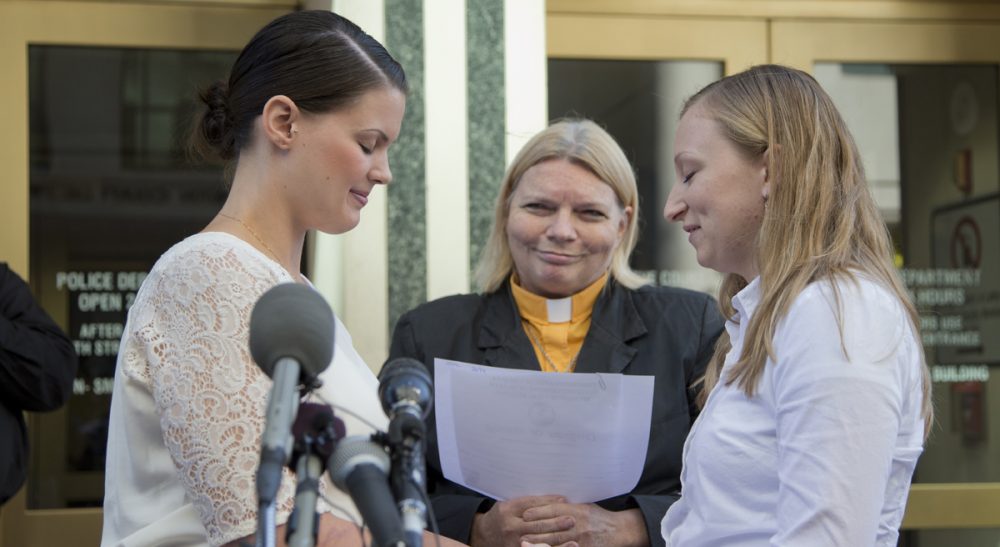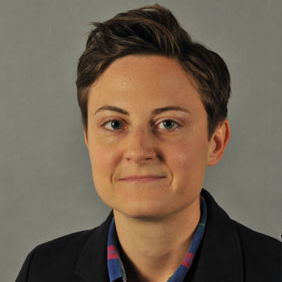Advertisement
The Death Of 'Family Values'? Let's Hope.

A year after their historic decision in the Windsor case declaring unconstitutional a federal ban on gay marriage, the Supreme Court has refused to interfere with lower courts striking down similar bans in five states, clearing the way for the expansion of legal same-sex marriage to thirty states, the majority of the union. Couples demanding rights as spouses and parents are redefining the American family, even in heartland states like Kansas and the Carolinas.
The end of federal resistance to [gay marriage] seems to call the time of death for a strain of conservative political rhetoric commonly called “family values,” which holds that the strength of the nation depends on the health of the family, an institution on the brink of disintegration due to lax social mores.
The end of federal resistance to this movement seems to call the time of death for a strain of conservative political rhetoric commonly called “family values,” which holds that the strength of the nation depends on the health of the family, an institution on the brink of disintegration due to lax social mores. Wielders of this argument remind us that the American family is the literal breeding ground of citizens and, therefore, the sociopolitical future. Thus, the family figures as the bulwark of traditional values that must be protected from the liberal drift of American culture.
Although "family values" was regarded by many as a new turn in American politics in the 1990s, this rhetoric is nothing new. Long before Dan Quayle skewered the sitcom “Murphy Brown” for its depiction of single motherhood, before Pat Buchanan and the culture wars, before Jerry Falwell blamed feminists and homosexuals for the 9/11 attacks, there was George Fitzhugh. In 1857, this pundit declared, “The Family is threatened and all men North or South who love and revere it, should be up and a doing.”
For Fitzhugh, the menace was the abolition of slavery, a centuries old institution in the United States of his time. He believed that emancipating enslaved African Americans would endanger the traditional American family and society as a whole: “Abolition contemplates the total overthrow of the Family and all other existing social, moral, religious, and governmental institutions.” Fitzhugh and his ilk held African Americans to be incapable of traditional family life and envisioned interracial society as sexually dangerous, a fundamental threat to the perpetuation of American culture as it had always been. Clearly, the specter of the American family in crisis is a deeply rooted scare tactic in American politics and not likely to be exorcised easily.
For hundreds of years, saddling certain groups – African Americans, working women and immigrants, for instance – with a reputation for being dangerous to the family has been a durable conservative strategy in the United States. In the early twentieth century, for example, women’s pursuit of suffrage met with condemnation from those who viewed this as a refusal of the traditional duties of wives and mothers. Experts in the social sciences and even the White House warned that women’s political aspirations were depressing the white birth rate, creating an opening for people of color and recent immigrants to dominate the population. In 1910, one detractor denounced “those of the weaker sex who seek to vote, for advocating race suicide," even calling them “murderers.”
Decades later, this rhetoric was revived in attacks on the Equal Rights Amendment. In 1979, Phyllis Schlafley described the women’s rights movement as “highly detrimental to our country and to our families.” In her formulation, which played a significant role in killing the amendment, national stability requires gender inequality.
Conservatives, however, are not alone in exalting the family as the bedrock of political ethics. Leaders of supposedly subversive causes have consistently taken up the family values banner themselves. Early feminists, for example, insisted that access to birth control would actually strengthen the American family and the national "stock."
For hundreds of years, saddling certain groups – African Americans, working women and immigrants, for instance – with a reputation for being dangerous to the family has been a durable conservative strategy in the United States.
It is in the name of families that the gay rights movement has organized its demand for legal rights and recognition in recent years. The Windsor decision notes that the Defense of Marriage Act “humiliates tens of thousands of children now being raised by same-sex couples. The law in question makes it even more difficult for the children to understand the integrity and closeness of their own family and its concord with other families in their community.”
Same-sex marriage is now understood as a way to protect children and their families, rather than as an affront to the family as an institution, so that the mainstreaming of gay relationships has been accomplished through the very familial rhetoric that has long marginalized them.
Despite our roots as a society of individual rights, family membership remains essential criteria for national belonging. Although the triumph of the Windsor decision for same-sex married couples and their dependents may seem to mark the demise of "family values" politics, we would do well to remember that homosexuals were not the first group perceived as a threat to American society's most cherished institution. We will likely not be the last. Who will be next on the wrong side of the line between “us” and “them,” guarded in the name of the American family?
Related:
